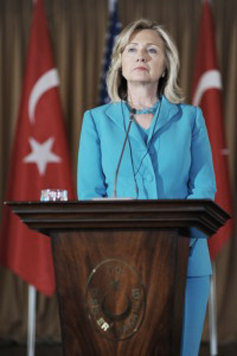Clinton Advisers Working to Develop Substance Abuse Policies

A recent online Associated Press article focuses on two top policy advisers from Hillary Clinton’s presidential campaign who are speaking with Iowa and New Hampshire substance abuse prevention advocates as part of developing drug addiction and drug addiction treatment-related campaign policies.
Clinton Campaign
According to the campaign officals, the two Clinton policy advisers, Maya Harris and Ann O’Leary, held video conferences with leading drug addiction and treatment advocates in New Hampshire and Iowa, both early-voting states. This follows Clinton’s April announcement that substance abuse treatment and mental health would be made a “big part” of the Clinton campaign. According to Clinton, this came about after she heard about it on the campaign trail in both states.
In a Keene, New Hampshire event, Clinton called the substance abuse problem “a quiet epidemic” that strikes rural areas and small towns as much as it does any large city. According to the AP article, an attendee at the furniture factory roundtable event, Clinton was asked her thoughts on the substance abuse issue by a participant with family drug addiction issues.
In 2014, New Hampshire logged more than 300 deaths due to substance abuse. The state also ranks second lowest in the nation for treatment capacity, behind the state of Texas.
The Campaign Promises
According to her campaign, Clinton says she believes that treatment programs should be “appropriately funded” by the states; and addiction should be treated by insurance companies in the same way physical health is treated.
A focus on substance abuse prevention and treatment taking precedence over criminalization and a shortage of treatment capacity nationwide were discussed. Ideas on how to go about adequately funding and providing access to substance abuse treatment and mental health programs were also discussed. According to campaign officials, policy addressing these areas will start rolling out as part of the Clinton campaign over the next weeks and months.
The New Hampshire participants in exchange of ideas included a member of the Governor’s Commission on Prevention, Treatment and Recovery, a number of law enforcement personnel, a small business owner, a recovering addict now running a recovery program, the executive director of New Futures, and the executive director of an alcohol and drug service providers association in New Hampshire.
The Devil’s Advocate
According to a CNNMoney article entitled, Big Pharma Opens Wallet to Dems (2007), Senators Hillary Clinton and Barack Obama were the top recipients of pharmaceutical industry donations. The data was provided by a Washington, D.C. non-partisan, non-profit organization,The Center for Responsive Politics.
Through January 31st of 2007, Clinton took $174,000 in Big Pharma donations, and Obama took $181,000. While lining their pockets with drug-maker money, the two continued to consistently bash the Big Pharma industry, as well as vowing to lower drug prices.
The Democrats, like Clinton, have a history of greasing their campaign palms with Big Pharma money, it seems. The 2004 presidential election saw drugmakers donate $516,000 to Bush’s campaign, a substantially greater amount than the $280,000 “given” to Democratic candidate, Senator John Kerry.
Both Senators Obama and Clinton moved on to bigger and better things, and now wield greater power and wealth than they did as mere Senators. Big Pharma continues to wield greater power and wealth, and cuts a wider swath of destruction as each year ticks by, drowning America in its flood of highly addictive pharmaceutical painkillers.
A cursory online search of questionable connections and serious conflicts of interest sheds light on Clinton and her bedfellows. The age-old truism to “follow the money” is the road that takes you to the information you need to know when you case your vote.
It begs the question, is it good and honest and right to grease a campaign trail with promises to help all the addicts the campaigner herself likely had a hand in making?


